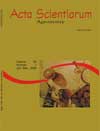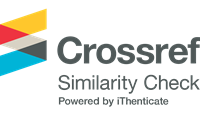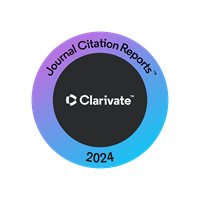<b>Adaptability and stability of bean genotypes in <em>Santa Catarina</em> State</b> - DOI: 10.4025/actasciagron.v27i2.1850
Abstract
The selection of productive and consistent genotypes related to environment variations is the basic objective of genetic breeding of any cultivated species. Therefore, in order to quantify the genotype interaction in environments and also to study the grain yield stability, methods such as the bi-segmented linear regression (Cruz et al., 1989), Lin e Binns (1988) and the traditional method were used. The experiments were carried out in ten locations in Santa Catarina in the 2000/01 and 2001/02 growing seasons. Each assay was composed of 13 black bean genotypes, which were assessed in a randomized complete block design with four replications. Data showed that BRS Campeiro, AN 9021332, IPR Uirapuru and LP 98-5 genotypes had the best general adaptation. Genotypes with specific adaptation were also identified, although the only concordance among the methodologies was the indication of the IPR Uirapuru cultivar for favorable environments.Downloads
Download data is not yet available.
Published
2008-04-07
How to Cite
Backes, R. L., Elias, H. T., Hemp, S., & Nicknich, W. (2008). <b>Adaptability and stability of bean genotypes in <em>Santa Catarina</em> State</b> - DOI: 10.4025/actasciagron.v27i2.1850. Acta Scientiarum. Agronomy, 27(2), 309-314. https://doi.org/10.4025/actasciagron.v27i2.1850
Issue
Section
Genetics and Plant Breeding
DECLARATION OF ORIGINALITY AND COPYRIGHTS
I Declare that current article is original and has not been submitted for publication, in part or in whole, to any other national or international journal.
The copyrights belong exclusively to the authors. Published content is licensed under Creative Commons Attribution 4.0 (CC BY 4.0) guidelines, which allows sharing (copy and distribution of the material in any medium or format) and adaptation (remix, transform, and build upon the material) for any purpose, even commercially, under the terms of attribution.
2.0
2019CiteScore
60th percentile
Powered by 

2.0
2019CiteScore
60th percentile
Powered by 



















































